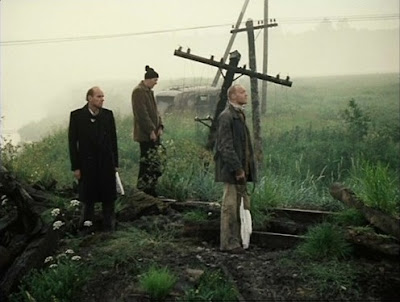Given the previous sci-fi oddities and because I've been sick all weekend, I doubled up again. This was originally just going to be the other one, but once we had Godard's and Fassbinder's, I figured a Tarkovsky sci-fi trip was needed. I'd previously seen Solaris (S&S #154, 1972) and remember only finding it slooow, and thus we resolve to...

Stalker
dir. Andrei Tarkovsky. 1979, USSR.
Sight & Sound 2012: Critics' #29 / Directors' #30
New York Times movie review
Kino DVD from Amazon
Watch via YouTube
Stalker Soviet trailer (1979)
Stalker: Take music, for instance. Less than anything else, it is connected to reality, or if connected at all, it's done mechanically, not by way of ideas, just by a sheer sound, devoid of... any associations. And yet, music, as if by some miracle, gets through to our heart. What is it that resonates in us in response to noise brought to harmony, making it the source of the greatest delight which stuns us and brings us together?
I don't have any biographical information. Was Tarkovsky a tour guide in a nuclear power plant or something? Where he always had to stop people from touching the sensitive controls? If I'm hiring a guide into the mysterious and forbidden outer lands, I think I'll follow his advice - rather than making up my own path. More philosophical explorations of what we can know, the axis of fear and desire, and extra-long slow tracking shots.

Different film styles used for in and out of The Zone, with the town under some high-contrast sepia tone. I noticed in Janet Maslin's (negative) NYT review the observation that the Writer, Professor and Stalker represent art, science and faith - which would have taken me a few more viewings to (maybe) catch. The Stalker's two clients expound at length on their personal theories, and it becomes a little tiresome until danger approaches and the explosives come out.
I read somewhere that upon release, this was regularly compared to Apocalypse Now (also 1979) - strangely enough, I can see the point. But what I was reminded of mostly was a bleak, minimalist version of the TV series Lost, except shot at an abandoned industrial park instead of Hawaii. Like on The Island, dangers are all obscure or even imaginary, and the methods of detecting or avoiding them arcane. The Zone draws some people inexorably back, with an internal mythological backstory, there's a hatch that leads to some place of power, and everyone wants a piece of the magic for themselves.
Excellent music on this one - I want the soundtrack!

I almost picked up this next DVD at Half-Price Books, but then I foolishly delayed to check on transfer quality. It was gone when I returned, and I eventually picked it up at full-price. And then I was surprised to see it rank so highly on the S&S poll. Lesson: learned.

Mirror (Zerkalo)
dir. Andrei Tarkovsky. 1975, USSR.
Sight & Sound 2012: Critics' #19 / Directors' #9
New York Times movie review
Kino DVD from Amazon
Watch via Amazon Instant / YouTube
Mirror Soviet trailer (1975)
This beautiful, personal, time-tripping semi-autobiography is quite the expressive and technical achievement. Tarkovsky uses all the tricks in his bag, probably... intercutting small-scale, detailed realism with hallucinatory reverie - mixing B&W, color, newsreel, film stocks, homage, family drama, special effects, pretty much anything and everything. I don't remember this movie being a major point of reference when Oliver Stone was mixing it up for JFK and Natural Born Killers, but Tarkovsky was obviously there first. Actual childhood memories from before and during WWII were apparently used as inspiration, but I'm not so sure about the adult sections with the ex-wife and child. Actually deep, deep stuff.

Don't want to make any sweeping cultural judgments based on a couple of movies, but Russian characters don't appear very into the whole 'logical action' thing. And whereas some people who are ruled by their passions might have an open sense of adventure or at least a laconic attitude towards repercussions, that does not seem to be the case here. I spent much of these two films trying to tease out comprehensible motivations.

No comments:
Post a Comment